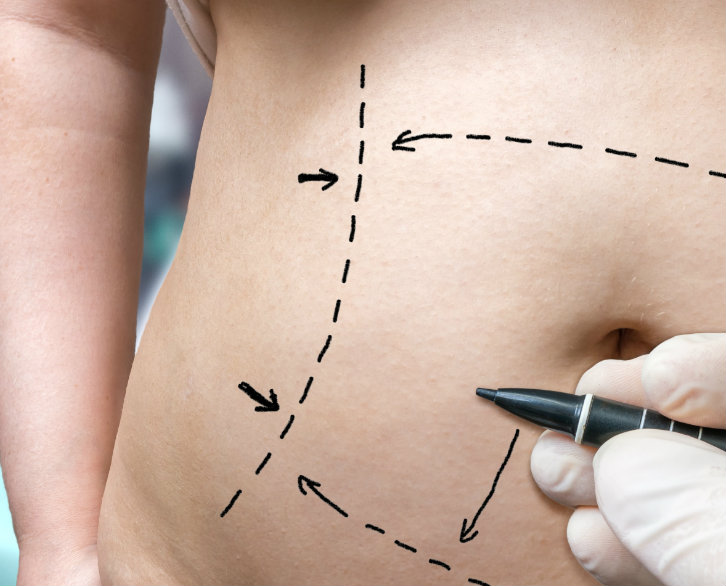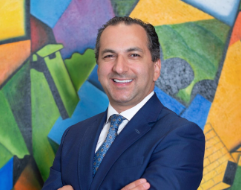
If you want to lose weight for health or appearance reasons, you may be wondering about surgery for weight loss. Bariatric surgery (also known as weight loss surgery) helps obese patients achieve and maintain healthy weights by restricting hunger, in addition to adding a healthy diet and exercise.
Liposuction, on the other hand, is a cosmetic surgery designed to change the shape of the human body by removing fat cells. Unlike bariatric surgery, it is not intended to treat patients who suffer from obesity.
These surgeries may seem to have similar aims, but they’re actually quite different regarding the types of patients who have them. Here’s a look at how bariatric surgery and liposuction compare.
Bariatric surgery
Bariatric surgery restricts the amount of food a stomach can hold, decreasing hunger and food intake while causing malabsorption of nutrients. There are several types of bariatric surgeries, including gastric bypass surgery, Lap-Band surgery, gastric sleeve surgery and gastric balloon surgery.
- To qualify for bariatric surgery: A patient be at least 100 pounds overweight or have a body mass index of 40 or higher, or have a body mass index of at least 35 and be suffering from an obesity-related condition such as type II diabetes or hypertension. In both cases, the potential patient must have been unable to sustain a healthy weight loss with other efforts.
- Bariatric surgery is not a “quick fix” surgery: Patients must be committed to adopting healthy lifestyle practices like nutrition and exercise in order to maintain long-term results.
- For some, bariatric surgery is a life-saving procedure: By losing excess weight and keeping it off, some patients may experience reversals of health conditions they had before surgery.
Which bariatric surgery is right for you?
Liposuction
Liposuction is a procedure that slims and reshapes body areas by removing excess fat and improving body proportion. Liposuction is a cosmetic procedure, which means it is an elective surgery whose purpose is solely focused on improving the individual’s appearance.
- Cosmetic surgeons are concerned with “problem areas”: Instead of examining lifestyle habits related to ill health (such as eating high-calorie foods and not exercising) and coming up with a strategy to improve those, cosmetic surgeons are concerned with making “problem areas” look more toned and contoured.
- How it’s done: During the procedure, a hollow instrument named a cannula is inserted under the skin. A vacuum is then affixed to the cannula, which breaks up and sucks out fat cells from the body.
- Where can it be performed? Liposuction can be used on fat-filled body parts like abdomens, buttocks, thighs, necks, chins and arms. It is not a cure for cellulite, which can still appear even after the surgery is completed.
Liposuction is a surgery that is appropriate for those who are in generally good health, who are not obese and who are within 30 percent of their ideal body weight. Potential liposuction patients have areas that have not responded to diet and exercise but that are still fatty or not aesthetically appealing to the patient. While fat cells are permanently removed from the body during liposuction, those fat cells that are left may grow bigger without proper diet and exercise after the surgery. Weight loss results may be more immediately noticeable with liposuction, but like bariatric surgery, proper maintenance is required to maintain the look.
Similarities and differences
Both bariatric surgery and liposuction are surgeries that require preparation, general anesthesia and recovery time. Scarring may occur at incision points, and several days off work or away from daily activities are usually required for recovery.
After bariatric surgery, the patient will adhere to a diet plan that gradually moves from a liquid diet to solid food. Patients will be aware of how much they should be eating so they don’t stretch out their stomach or damage the potential results from the surgery. Patients can expect to attend regular weight loss support groups with other patients who have undergone bariatric surgery.
For liposuction patients, it is up to the patient to maintain their ideal weight to make the results from liposuction permanent. Patients can expect swelling and inflammation for about four weeks after the surgery. Afterward, not maintaining a healthy diet and exercise routine may cause the patient to see new areas where excess fat appears. Many liposuction patients resort to “touch-ups” or repeat liposuction procedures, which increase a patient’s risk whenever they undergo another surgery.
If you are suffering from obesity and want a long-term solution for weight loss and want to transition to a healthier lifestyle, bariatric surgery makes more sense. If you are a relatively healthy weight and want to minimize a stubborn problem area that hasn’t responded to improvements in diet and exercise, you should consider liposuction an option.
Learn more about bariatric surgery in Los Angeles
If you suffer from obesity and have been unsuccessful in losing weight through diet and exercise alone, you may qualify and benefit from bariatric surgery. To schedule a free weight loss surgery consultation in the Los Angeles area, please contact Soma Weight Loss at (855) 766-2411 or online for weight loss surgery information.




